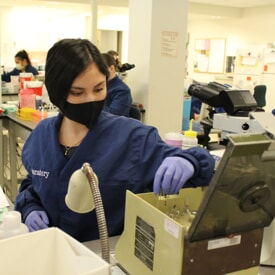
Please refer to Tuition& Fees page.
Affiliated labs partner with the School of MLS (SMLS) to offer students
tuition assistance and clinical rotations in exchange for a 30-month work
commitment after graduation. Contract locations change based on site needs,
and SMLS notifies candidates of available openings before the February 1st application due date.
Contracted locations may include Spokane, WA, Stevens County, WA, Southeast
WA, North and South Puget Sound, WA, Oregon, and rural Alaska sites.
The 12 month program is full-time, in-person, Monday-Friday for one year.
Most learning experiences occur during the day, Monday-Friday. Shifts can
start as early as 5am. Students may be required to rotate on an evening
shift, but currently are not rotating on night shift. Students must complete
the entire training to graduate and be eligible to take the national certification
exam. Please inquire as to the availability of learning tracks prior to applying.
Most students work fewer than 16 hours per week, usually on weekends. Entry-level lab positions may be offered based on local demand. Qualified Providence caregivers may be eligible for tuition reimbursement.
Clinical rotations encompass all core disciplines essential for generalist training, such as chemistry, microbiology, hematology, and transfusion medicine. Clinical rotations are offered at urban, rural and reference laboratories. Depending on regional rotation availability, students may be able to rotate in specialty laboratories such as flow cytometry, special chemistry, advanced coagulation, parasitology and mycology.
Qualified students receive notification of acceptance two months after the application is due.
Interviews must be in person and are required as part of the selection process. Interviews are held two to six weeks after the application is due.
Medical Laboratory Scientists (MLS) need at least a bachelor's degree, while Medical Laboratory Technicians (MLT) require an associate’s degree or technical certificate. MLTs may be restricted in the tests they perform, whereas MLS professionals typically handle more complex testing, data interpretation, and troubleshooting, complying with the bachelor’s degree requirement outlined by CLIA.
For more information on MLT programs operating in Spokane, WA region, please visit the following schools:
No. Certified scientists working in clinical laboratories are now officially titled Medical Laboratory Scientists (MLS). The ASCP Board of Certification introduced the MLS(ASCP) designation in 2009, and AMT aligned with this standard in 2023, collaborating with ASCP and ASCLS. Some states still use CLS for MLS licensure, but MLS is the national title. In 2012, our school updated its name to Providence Sacred Heart Medical Center School of Medical Laboratory Science to reflect these changes.
Yes, for applicants who meet all California CLS educational requirements and obtain the CA CLS Trainee License prior to starting our program. Starting in 2026-27, the School of MLS (SMLS) will meet the CA CLS licensure requirement of one year of post-baccalaureate clinical training for those applicants interested in working in CA after SMLS completion. Applicants are responsible for verifying their eligibility for CA licensure, as we cannot guarantee licensure eligibility for another state. We support CA licensure application by attesting to SMLS graduates' education and clinical experience. Our program does not offer concurrent training with CA universities.
If operating under a visa, we recommend application to NAACLS accredited university-based programs, as most are federally qualified to accept visas. The School of MLS is a hospital-based program with a different federal classification, which limits acceptable visa types.
A concurrent training applicant enters the School of MLS while still enrolled in university. An affiliation agreement must be established between your university and our MLS program in order for you to enter the program as a concurrent student. Please refer to the Program Description page for a current list of Academic Affiliates.
Yes, the School of MLS is nationally accredited by the National Accrediting Agency for Clinical Laboratory Sciences. NAACLS 5600 N. River Rd, Suite 720 Rosemont IL 60018-5119; ph: 773.714.8880; fx: 773.714.8886; info@naacls.org.
Since 1928, ASCP (American Society for Clinical Pathology) Board of Certification (BOC) (formerly the ASCP Board of Registry) has been widely recognized as the preeminent leader in the certification of medical laboratory professionals. The majority of employers hire only certified staff.